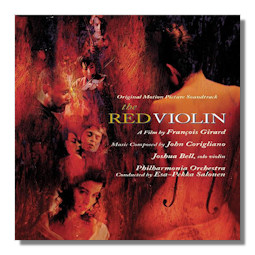
The Internet's Premier Classical Music Source
Related Links
- Corigliano Reviews
- Latest Reviews
- More Reviews
-
By Composer
-
Collections
DVD & Blu-ray
Books
Concert Reviews
Articles/Interviews
Software
Audio
Search Amazon
Recommended Links
Site News
 CD Review
CD Review
John Corigliano

- The Red Violin (Film Score)
- Chaconne for Violin & Orchestra "The Red Violin"
Joshua Bell, violin
Philharmonia Orchestra/Esa-Pekka Salonen
Sony Classical 88697-60863-2
This is not your average soundtrack. Few films are about a violin that is over three centuries old, and most films don't have this kind of star power behind it. Yet, here it is. John Corigliano's magnificent score to The Red Violin, which later became a Chaconne and then a concerto, is compelling any way you slice it. Having Joshua Bell as the "voice" of the title instrument hurts not a bit, and Salonen is his usual reliable self in music like this.
Here in 1998, Bell wasn't quite the rounded artist he has since become, but he still was one of the industry's brightest stars. He plays with a lovely tone, and thankfully he's not spotlighted in any obscene way on the album. That's not to say he's not forward in the mix, he just doesn't drown out the orchestra. This is a very good thing, since the Philharmonia is an equal partner here. You don't have to know a darn thing about the film in question – and you still won't after reading the notes – to realize that Corigliano is a master writer in all forms. Having just reviewed Bell in the latterly composed Concerto I am amazed at how Corigliano took a simple melody, created a Chaconne, created a film score, and then took both those compositions and created a concerto. And guess what? The Chaconne stands alone easily, the score is brilliant, and the concerto deserves to be heard all over the world. That's genius.
Sony admirably recorded this project, although there are some odd sonic shifts between movements. I am hoping these were intentional for the film. Also, whatever the tapping sound is in the Etudes of Part II proves to be very obnoxious very quickly. Still, these are minor complaints. People who love film scores should eat this up if they haven't already, and classical enthusiasts who pooh-pooh this kind of thing will have to realize that this music gave us more great music. Everyone wins, really. A unique release.
Copyright © 2014, Brian Wigman



















